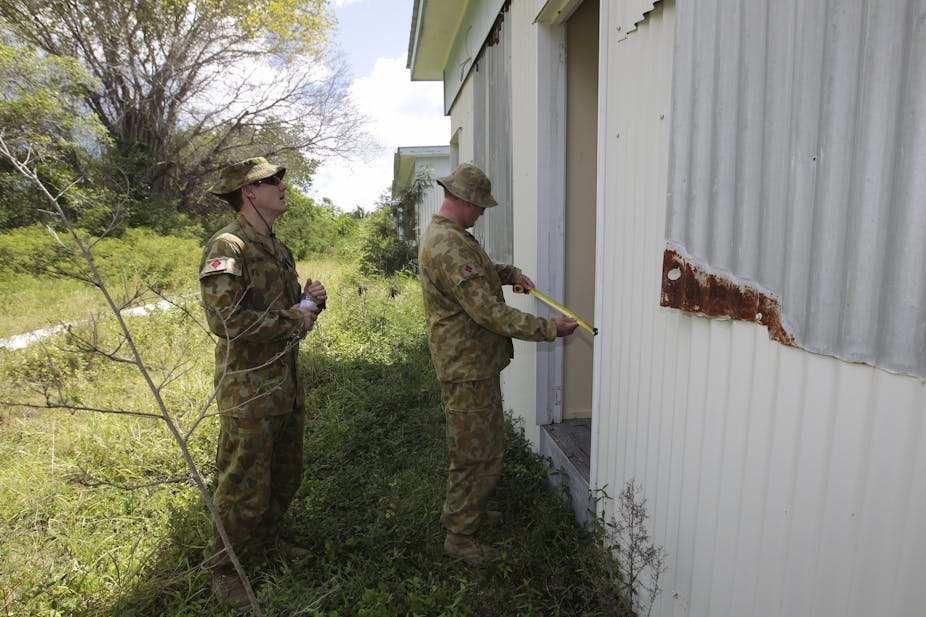The Houston panel reported on Monday 13 August 2012. The government has committed to implementing all of its recommendations.
In fact, one of its recommendations (recommendation 7) has already been implemented. Migration Legislation Amendment (Regional Processing and Other Measures) Act 2012 (Cth) received royal assent on 17 August 2012 and is now in force.
As everybody now knows, passage of the Act has cleared the way for the immediate reinstitution of the “Pacific Solution” (recommendations 8 and 9) and, in theory, for implementation of the “Malaysian Solution” (recommendation 10) as well. Unfortunately, we may not yet have hit bottom. Here’s why.
The panel’s recommendation 15 was “that a thorough review of refugee status determination (RSD) would be timely and useful.” It sounds innocuous doesn’t it?
In this, as in so many things, context is everything. The context here is provided by two principles set out in recommendation 1 of the report, which the panel states “should shape Australian policy making on asylum seeker issues”. They are:
“The facilitation of a regional cooperation and protection framework that is consistent in the processing of asylum claims, the provision of assistance while those claims are being assessed and the achievement of durable outcomes.
The application of a ‘no advantage’ principle to ensure that no benefit is gained through circumventing regular migration arrangements.”
The Conversation’s asylum seeker expert panel, of which I was a member, also recommended that there should be regional consistency in processing and outcomes. If such consistency exists, asylum seekers have less incentive to travel onward from their initial country of refuge because they will gain, in the Houston panel’s terms, “no advantage” by so doing.
However, we added an important rider which the Houston panel did not. We said that consistency should be achieved by “bringing the situation for all those seeking asylum up to highest existing standards in the region or better.” This is the most ethical way of achieving consistency but it is also the most difficult and most expensive.
There is also a cheap and easy, but obviously unethical way of achieving consistency, which is to bring standards throughout the region down to the lowest common denominator regardless of how low that might be. And then there is the third way, which is to bring some countries in the region up to minimum acceptable standards while bringing other countries down to minimum acceptable standards.
Since another of the principles articulated in recommendation 1 of the Houston report is “[a]dherence by Australia to its international obligations”, the Houston panel clearly did not intend to countenance Australia falling below minimum acceptable standards. However, the view of the panel seems to be that in the legal protections provided to asylum seekers in Australia we should deliberately aim for no more than a bare pass.
That view is the subtext of paragraph 3.75 elaborating on recommendation 15:
“Over recent years, comparable countries such as the United Kingdom and Canada have undertaken significant reform of their migration legislation and processes for the determination of refugee status, including appeal rights. It would be relevant to assess whether there are aspects of such reforms that would be relevant in Australia’s circumstances.”
Not convinced? Well here is what the panel later highlights about the recent reforms in the UK (p106):
“The UK adopts a targeted range of restrictions on appeals, including deadlines to appeal, some limitations on who can appeal, how many times an individual can appeal and access to free legal representation.”
In paragraph 3.76 of the report, the panel says eight things should be included in the scope of the recommendation 15 review. One of these is “a more expeditious assessment process to finalise RSDs”. Restrictions on appeal certainly make for more expeditious finalisation of RSDs, but it also makes for less fairness in the process and greater risk that valid refugee claims will be rejected.
As the panel itself notes, there are presently in Australia “a significant number of negative decisions at primary assessment which are overturned on review.” Moreover, the panel explicitly states that the UK’s processes are one of the factors explaining the lower overall refugee recognition rates for certain nationalities in the UK compared to Australia.
Australia, as a developed country and a liberal democracy, usually aims for and achieves much better than a bare pass for its legal system. What counts as a bare pass, as opposed to a fail, is always contestable (as evidenced by the line of students outside my door after exam results are released). Aiming high is the best way of ensuring we do not fall short.
Of course, those who regard asylum seekers as “the enemy at the gates” may think it of little consequence if we do fall short. However, such people would do well to keep in mind these words of Thomas Paine in his Dissertation on the First Principles of Government: “He that would make his own liberty secure must guard even his enemy from oppression; for if he violates this duty, he establishes a precedent that will reach to himself.”

